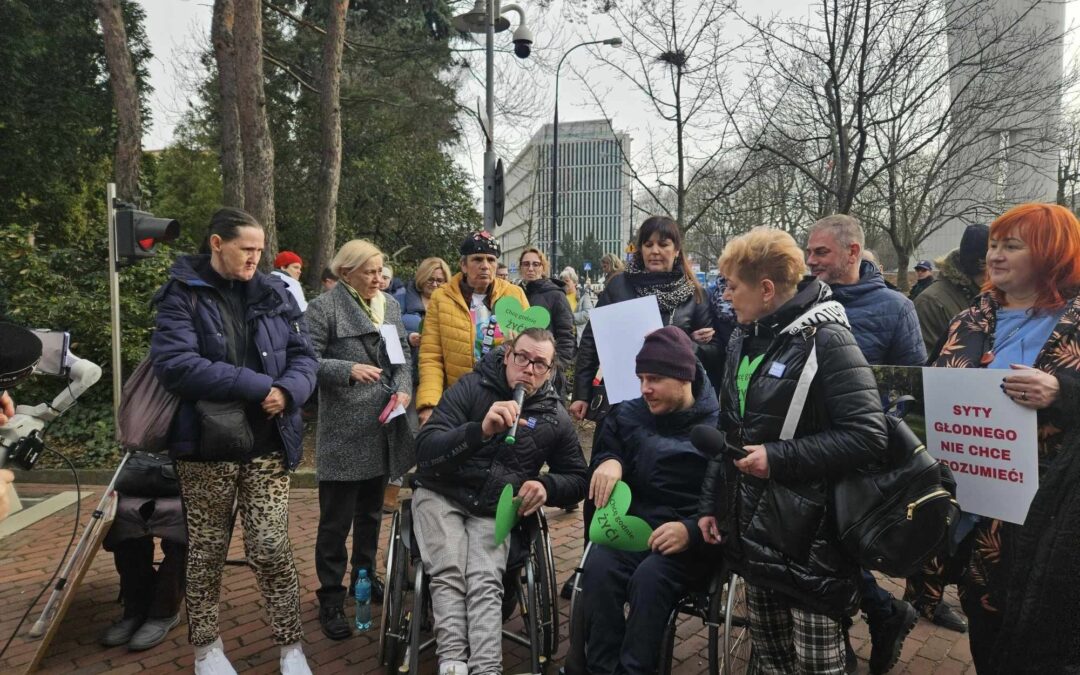Disabled people and their carers have protested outside parliament, demanding that the government fulfil its pre-election promise to increase their welfare allowance to the level of the minimum wage. Currently it stands at less than half that figure.
“Before the elections, they promoted themselves using us,” one of the protesters, Alicja Jochymek, the mother of a disabled daughter, told news website Wirtualna Polska. “Now they are in power, so it’s time to pass a bill.”
“We’ve had enough of trips to Warsaw,” she added, referring to protests that began under the previous government. “We hoped that after the change of government, we would not have to protest again for a decent life. We supported the current [ruling] coalition and we cannot imagine that they would let us down.”
Przed Sejmem trwa protest osób niepełnosprawnych i ich opiekunów.
📽 @ArturMachnik pic.twitter.com/5ocb5KIHlN— Radio Rebeliant (@RadioRebeliant) March 21, 2024
The group’s main demand is that the so-called “social pension”, which is paid to people who are unable to work for health reasons and currently stands at 1,781 zloty (€413) per month, is raised to the level of the minimum wage, which is currently 4,242 zloty (€983) gross per month.
Doing so was one of the 100 policies Donald Tusk, the current prime minister, promised to implement in his government’s first 100 days in power, a period that finishes today. However, as with the vast majority of those promises, it has not been fulfilled.
“I’m angry,” Aleksandra Chromik, the mother of a disabled daughter, told Wirtualna Polska. “We were let down by our friends in parliament from the then opposition, and today from the ruling camp…We need this money to live with dignity.”
The government has only fulfilled 12 of the 100 policies @donaldtusk promised to introduce in his first 100 days in office, a period that finishes this week.
One of his MPs blames the fact they have to rule with coalition partners and a hostile president https://t.co/KpQxWOULxJ
— Notes from Poland 🇵🇱 (@notesfrompoland) March 18, 2024
The protesters were joined by Iwona Hartwich, an MP from the ruling coalition but also the mother of a disabled son who was the originator of a civic initiative – a type of legislation submitted to parliament with the support of public signatures – that would raise the social pension.
“This cannot wait [any longer],” she told Wirtualna Polska. “Because people with disabilities have nothing to live on.”
In January, when that civic initiative received its first reading in parliament, Tusk promised disabled people that “we will work hard and diligently to ensure that this bill you have been waiting for will be passed as soon as possible”.
Tusk do PiS: Ludzie niepełnosprawni nie są dla was warci nawet minuty uwagi #wyborcza https://t.co/wNWOg27yN1
— Gazeta Wyborcza.pl (@gazeta_wyborcza) January 25, 2024
However, since then, the legislation has not proceeded to a second reading, with the speaker of parliament, Szymon Hołownia, and the government’s plenipotentiary for disabled people, Łukasz Krasoń, saying that it must be integrated with a bill put forward by the government itself.
Yesterday, Krasoń came to speak to those protesting outside parliament. He told them that, before the bill can proceed further, final positions on it still need to be submitted by the finance ministry and the prime minister’s chancellery. It is estimated that 293,000 people receive the social pension.
Katarzyna Ueberhan, an MP from the ruling coalition and head of the parliamentary social policy and family committee, said that delays had been caused by the current “mess in the regulations”, reports the Polish Press Agency (PAP). Her committee is due to discuss the bill further next month.
The recent ruling in Poland banning abortion in the case of serious birth defects has focused attention on how the state supports parents of disabled children.@AnnaZabl spoke with three families about the challenges they facehttps://t.co/UAH2kUx9My
— Notes from Poland 🇵🇱 (@notesfrompoland) December 2, 2020

Notes from Poland is run by a small editorial team and published by an independent, non-profit foundation that is funded through donations from our readers. We cannot do what we do without your support.
Main image credit: Alicja Jochymek/Facebook

Daniel Tilles is editor-in-chief of Notes from Poland. He has written on Polish affairs for a wide range of publications, including Foreign Policy, POLITICO Europe, EUobserver and Dziennik Gazeta Prawna.



















